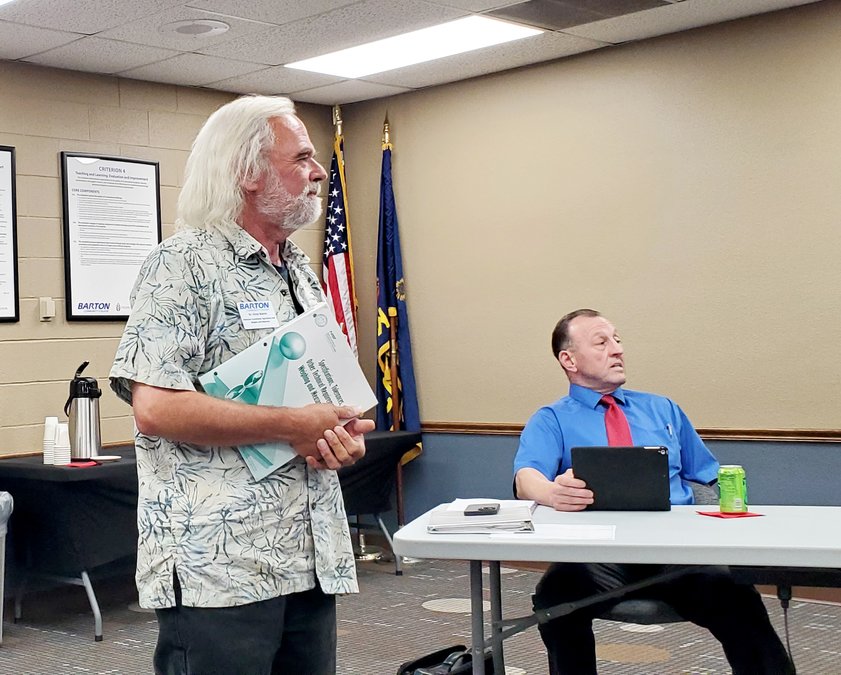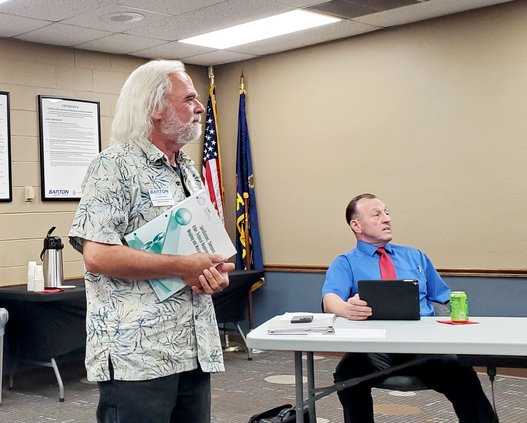Adopting the metric system
The U.S. Congress authorized the use of the metric system in 1866 and almost a decade later America became one of the 17 original signatory nations to the Treaty of the Meter.
The Metric Conversion Act of 1975 was approved by Congress and signed into law by U.S. President Gerald Ford. That is one reason why soda is now sold in 2-liter bottles. However, the system is voluntary and other liquids, such as milk or gasoline, are still sold by the gallon.
Dr. Vic Martin at Barton Community College said the Scale Technician Certificate Program offered here offers training for a career that has been “under the radar” until now. He briefly described the program at last week’s BCC Board of Trustees meeting, noting that commerce, industry, and consumers depend on accurate measurements, especially (but not limited to) of weight.
“Maybe we don’t think about it, but you go to the grocery store, you go to the gas station – wherever you go – things are measured commercially,” Martin said, showing a thick copy of a specifications handbook issued by the state.
“This book is updated every year,” he said. It includes “everything that you can think of when you are buying something based on a measurement.” That can be a taxicab meter, or a gas pump, or a machine that measures cloth sold at a fabric store, or the scales that weigh vegetables at a grocery store or grain at an elevator.
The technology in this field is changing rapidly. All 50 states have certification requirements. In Kansas alone, there are over 20,000 commercial scales and an equal number of non-commercial scales in services.
That’s where Barton’s certificate program comes in, Martin said. People are needed to repair, calibrate and certify the accuracy of scales.
“It’s the kind of job that nobody really knows about, but is critically important,” Martin said, noting “scales are everywhere.”
Businesses hire people and train them, or send employees to scale companies for training. There is a need for employees with the proper knowledge base. In many cases, it helps if they have a Commercial Driver’s License, and earning a CDL is part of Barton’s semester-long certificate program.
“All 50 states certify everything from gas pumps to scales, but they all choose how they do it. The advantage in the state of Kansas is, the requirements are so strict that if you have a Kansas (scales) license, every surrounding state except Colorado will just give you a license.”
With the growing need and an aging workforce, Barton has no trouble getting its students hired, Martin said. “In fact, they usually can have a job before they’re done with them semester. If they pass the program, they’ve got their Class A CDL, which isn’t necessary for every position but is for a lot of them, and the state of Kansas lets them take their small, medium and large scale tests. So as soon as they’re employed, they already have a license to certify scales.”
The program features strong industry partnerships that make it relevant and current; networking with professionals in the industry to give students an up-to-date perspective; and field trips that provide hands-on experience opportunities.
Last year the college trained more than 200 students in the program. Even though there is a severe shortage of licensed technicians, Martin said there aren’t many programs like the one Barton offers. That is why companies from other states will send people here for training.
The wages vary as do the types of work but Martin mentioned one company that normally starts technicians at $22 per hour but started a Barton-trained employee at $26. The Barton website for this program reports that salary ranges start at $35,000 annually with benefits and can exceed $50,000 in a relatively short period.
Courses in the 27-hour, one-semester certificate program include scale industry safety; scale rules and regulations; scale principles and technology; Commercial Driver’s License; technical math; DC circuits; and computer concepts and applications.
The next meeting of the BCC Board of Trustees will be a study session at 4 p.m. Tuesday, July 11, in Room F-30 of the Fine Arts Building.








